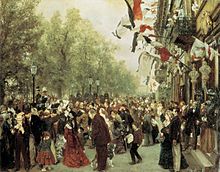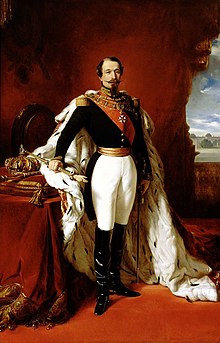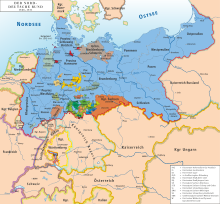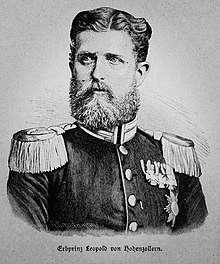Franco-Prussian War
Franco-German War
_-_Paris,_1871.jpg)
Ruined house in Saint-Cloud, photograph documenting war damage, developed around 1871 in Adolphe Braun's Paris studio.
Battles and sieges of the
Franco-Prussian War (1870-1871)
Weissenburg - Spichern - Wörth - Colombey - Strasbourg - Toul - Mars-la-Tour - Gravelotte - Metz - Beaumont - Noisseville - Sedan - Sceaux - Chevilly - Bellevue - Artenay - Châtillon - Châteaudun - Le Bourget - Coulmiers - Amiens - Beaune-la-Rolande - Villepion - Loigny and Poupry - Orléans - Villiers - Beaugency - Nuits - Hallue - Bapaume - Villersexel - Le Mans - Lisaine - Saint-Quentin - Buzenval - Paris - Belfort
The Franco-Prussian War of 1870 to 1871 was a military conflict between France on the one hand and the North German Confederation led by Prussia and the southern German states of Bavaria, Württemberg, Baden and Hesse-Darmstadt allied with it on the other. The war was triggered by the dispute between France and Prussia over Prince Leopold of Hohenzollern-Sigmaringen's candidacy for the Spanish throne. On July 19, 1870, France declared war on Prussia. Contrary to the French emperor's expectations, the four southern German states entered the war. Meanwhile, the other European powers remained neutral.
Within a few weeks in the late summer of 1870, the German allies defeated large parts of the French armies. After the Battle of Sedan in northern France, Emperor Napoleon III went into captivity on September 2, 1870. A provisional national government was then formed in Paris, which proclaimed a republic, continued the war, and raised new armies. But even the new government failed to turn the tide. After the fall of Paris, the French government found itself ready for the Versailles preliminary peace in February 1871. Officially, the war ended on May 10, 1871, with the Peace of Frankfurt.
The most important results of the war were the founding of the German Empire and the end of the Second French Empire. As a result of its defeat, France had to cede to the German Empire the territories later known as the Reichsland Alsace-Lorraine. This in turn resulted in the deepening of the "hereditary enmity" that lasted until the middle of the 20th century. Nearly 190,000 soldiers were killed in the war, and more than 230,000 were wounded. After the German-Danish War of 1864 and the German War of 1866, the conflict with France was the third and last of the German wars of unification. During its course, Baden, Bavaria, Württemberg and Hesse-Darmstadt joined the North German Confederation. With this and the constitution of January 1, 1871, the German Empire came into being. Also during the war, an internal French civil war broke out with the uprising of the Paris Commune, which was put down by the French government.
Designation and classification
The Franco-Prussian War is also known in German-speaking countries as the War of 1870/71. In the English-speaking world, the conflict is called the Franco-Prussian War, following the custom of naming the side declaring war first. The British designation particularly emphasizes the steering of the German side of the war by the Prussian government, but does not include the Prussian allies in northern and southern Germany. In the French research literature, the designation Guerre Franco-Prussienne (Franco-Prussian War) is also still present, but is increasingly being supplanted by the designation Guerre Franco-Allemande (Franco-German War). In Denmark, the war was more often dubbed fransk-tyske krig (French-German War) from the beginning.
The Franco-Prussian War took place in the industrial age. Therefore, similar to the Crimean War (1853 to 1856), the Sardinian War (1859), the American Civil War (1861-1865) and the German War (1866), it was fought with expanded weapons capabilities. This found expression in high casualty rates. Nearly 190,000 soldiers fell in the entire Franco-Prussian War. The Chassepot rifle, "long lead" - a projectile in the shape of an elongated drop - and grenades inflicted novel, severe wounds on soldiers. Fractures of bones caused by projectiles, loss of limbs, and exit wounds resulted in war injuries unheard of before.
In its second phase after the Battle of Sedan, the Franco-Prussian War also developed the characteristics of a war against an entire people. The French government around Léon Gambetta and Charles de Freycinet had called for a "guerre à outrance," that is, a "war to the extreme. It introduced universal conscription, raised new mass armies and intensified the fighting. This led to an increase in atrocities on both sides of the war. In the end, however, unlike in World War I, politicians still managed to prevail over the military leadership and bring the war to an end after a relatively short time. Nevertheless, since the Franco-Prussian War, it had to be assumed that wars would potentially be "fought on the French model with the full force of the people" (Stig Förster).
Previous story
Development until the German War
In France, the memory of the defeat of the Napoleonic empire continued to have an impact. The territorial downgrading of 1814/1815 was perceived as a severe humiliation. The Bourbon dynasty and the July monarchy could not live up to the public expectation of regaining the old influence. The disappointed hopes for a restoration of France's old position of power finally contributed in 1848 to the presidential election of Louis Napoleon, who four years later crowned himself Emperor of the French as Napoleon III. Napoleon III had already formulated his foreign policy goal during his exile. In his Idées Napoléoniennes, he envisaged weakening or dissolving Russia and Austria. Napoleon III wanted to replace them with liberal nation-states dependent on France. In the 1850s, Napoleon III still had foreign policy successes (Crimean War and Sardinian War) in this regard. In the 1860s, however, foreign policy setbacks (the French intervention in Mexico and the German War of 1866) became more frequent.
In the run-up to the German War, Prussian Prime Minister Bismarck tried to negotiate French neutrality. Napoleon III was not averse to this, but brought up territorial expansions (such as parts of Belgium, the Saar region and the Palatinate) in return for military standstill. Bismarck, however, gave Napoleon III no binding guarantees for territorial compensation. Napoleon III concluded a secret treaty with Austria that provided for France to cede the Prussian Rhineland in return for its neutrality. Napoleon III and his circle of advisors expected a prolonged war between Austria and Prussia. Therefore, they refrained from massing French troops for a quick intervention. Faced with this situation, Napoleon III tried to exert diplomatic pressure on Prussia. A month after the war-deciding Battle of Königgrätz, he demanded support from victorious Prussia for French territorial gains. The plans provided for the reclamation of territories that France had been allowed to retain in the First Peace of Paris of 1814 and had only had to cede to German states after the Battle of Waterloo in 1815.
The quick peace agreement with Austria ultimately prevented a French intervention. At the same time, the balance of power shifted: Prussia annexed the North German states of the Kingdom of Hanover, the Electorate of Hesse-Kassel, the Duchy of Nassau and the Free City of Frankfurt. The remaining northern German states joined the newly formed North GermanConfederation in 1867, further increasing Prussia's political weight. As late as 1860, Prussia had less than 50% of the French population. The North German Confederation of 1867 now had a population of 30 million, which was closer to the French population of 37 million. In addition, the North German Confederation's army was one-third larger than its French counterpart due to universal conscription. Calls for "revenge for Sadowa" (French name of the Battle of Königgrätz) arose in France. What was meant was disappointment in France at not having been sufficiently rewarded for neutrality in the German War. The French Minister of War commented on the French perception with the phrase: "We are the ones who were actually defeated at Sadowa" ("C'est nous qui avons été battus à Sadowa").
At the very least, France ensured that Prussia was only allowed to establish the federal state north of the Main line. The southern German states of Württemberg, Baden and Bavaria initially retained their state independence. From the French perspective, this was not insignificant. The three southern German states could muster an additional 200,000 soldiers in a potential war, and some of them bordered France directly. However, the nation-state exclusion of southern Germany was ultimately politically worthless, because as late as August 1866, Bismarck had succeeded in concluding secret protection and defense alliances (mutual defense in the event of a war of aggression) with Bavaria, Württemberg and Baden. The reason for the treaties was the new border demarcations, which put the southern German governments, which were fearful for their state sovereignty, in a predicament. Geographically, they found themselves between the great powers of Austria, France and the North German Confederation. The strengthening national movement allowed only a foreign policy orientation toward the North German Confederation.
Luxembourg crisis and rapprochement between France, Austria and Italy
After the Prussian-French negotiations on extensive territorial compensation failed in August 1866, the French government deviated from its original objective. It now demanded that Prussia support it in annexing the Grand Duchy of Luxembourg. In March 1867, the French government began negotiations with the Dutch king who ruled Luxembourg. William III agreed to hand over Luxembourg to France in return for financial compensation (5 million guilders). However, he also made the sale conditional on the approval of the Prussian monarch Wilhelm I. Bismarck then had the previously secret treaties of protection and trust with the southern German states printed in the Preußischer Staats-Anzeiger. The publication of the alliance strengthened a nationalist indignation against France in the German states. Impressed by this, the Dutch king refused to sign the treaty with France. Bismarck additionally appealed to the other major European powers to work for a peaceful settlement of the Luxembourg crisis. Thus, a conference was held in London in May 1867. In the course of this, France had to permanently relinquish its claims to Luxembourg. Prussia was forced to withdraw its garrison from the fortress.
The Luxembourg crisis brought about a rapprochement between France and Austria. Both great powers attempted to establish an alliance directed against Prussia. French diplomacy at times envisaged an expansion of the planned alliance to include Italy. However, insurmountable conflicts of interest between the three powers came to light. For example, the Italian government in Florence (the capital of Italy from 1865 to 1871) demanded the withdrawal of French troops from Rome, which protected the Papal States from Italian annexation. Furthermore, the Italian government claimed Austrian territories such as the Isonzo Valley and Trieste. Vienna, in turn, distrusted Paris. It was unwilling to support French territorial expansions into the area of the former German Confederation. For its part, the French government hoped that, although an alliance treaty with Austria and Italy ultimately failed to materialize, it would have backing in a possible war against Prussia. This assessment encouraged Paris to seek a diplomatic confrontation course with Prussia on the question of the Spanish succession.
Spanish Succession Crisis and Declaration of War
The immediate trigger of the Franco-Prussian War was the question of the succession to the Spanish throne. In September 1868, the military couped Queen Isabella II from the Spanish throne. The leaders of the coup subsequently sought a new king for Spain from the ruling houses of Europe. After several refusals from Italy and Portugal, the Spanish head of government, Juan Prim, finally turned to the Sigmaringen line of Hohenzollern in February 1870. The decision fell on Prince Leopold of Hohenzollern-Sigmaringen, the son of a former Prussian prime minister and a member of the Catholic collateral line of the King of Prussia who ruled in Berlin. Berlin and Madrid originally planned to keep their joint project secret from the public. Only after Leopold's confirmation as king by the Spanish parliament was political Paris to be informed of the royal candidacy. The strategy failed, as an error crept in during the decryption of a telegraph message from Berlin. The Spanish government now mistakenly assumed that the parliamentary vote on the royal candidacy would not take place until July 9, 1870. However, it was actually scheduled for June 26 - a date two weeks earlier. The result of the deciphering error was that the government prematurely dismissed parliament for the summer recess. When Juan Prim learned of the misunderstanding, he had to call Parliament back. On this occasion, he justified his decision by referring to the Spanish candidacy for the throne, which made the matter public.
A possible enthronement of Leopold as Spanish king aroused fears in France of a new dynastic grip, such as had already existed through Habsburg monarchs in the 16th and 17th centuries. Faced with already strong opposition from the Republicans in Parliament, the emperor and his government had to fear their fall. On July 6, 1870, French Foreign Minister Gramont delivered a speech to the legislative assembly, the Corps législatif. He accused the Prussian government of being behind the Spanish project and declared that this amounted to an injury to France's honor. Although Gramont did not speak directly of war in any word, his rhetoric could be interpreted as a threat of war against Prussia. On July 7, 1870, Gramont ordered the French ambassador to Prussia, Vincent Count Benedetti, to travel to Bad Ems. King Wilhelm I and his courtly entourage were staying in the town for a cure. Benedetti was to ask the king to withdraw Leopold's candidacy. On July 9, 1870, Wilhelm I explained to the French ambassador that he had supported the candidacy only as head of the Hohenzollerns, but not as Prussian king. It was a purely dynastic matter. Wilhelm I's confession strengthened Gramont's diplomatic position in Europe. He could now prove beyond doubt to the outside world that the Prussian government, with Bismarck at its head, was involved in the Spanish project. For example, Prince Reuss, the Prussian ambassador to Russia, telegraphed Wilhelm that Tsar Alexander II had advised him to abandon the candidacy. On July 10, 1870, Wilhelm I finally sent a special envoy to Sigmaringen. His task was to convince Karl Anton, Leopold's father, to renounce his candidacy. On July 12, Karl Anton renounced the Spanish crown on behalf of his son. Paris thus had a major diplomatic success on its hands.
The diplomatic victory was not enough for Gramont. Indeed, the signed waiver concealed any Prussian participation in the Spanish succession project. For this reason, Gramont demanded a public apology from Prussia. Ambassador Benedetti was to elicit a binding promise from the Prussian monarch that he would not promote any Spanish Hohenzollern candidacy in the future. On July 13, 1870, Benedetti sought out the monarch on the Bad Ems spa promenade. Wilhelm I responded politely to the demand, but nevertheless firmly rejected it. He feared a loss of face for Prussia. As long as only one non-ruling member of the Hohenzollern dynasty publicly withdrew his candidacy, the crisis could not discredit the reputation of the entire Prussian state. The situation would have been different had he himself, as monarch, made an official declaration to that effect. Wilhelm I was not prepared to prohibit "forever and ever" the accession of a Hohenzollern to the throne of Spain. When Benedetti informed Gramont of the rejection of the French demand, the foreign minister ordered another meeting with Wilhelm I the same day. The monarch, however, refused the French ambassador another audience, thus authorizing the Prussian Foreign Ministry to inform both the press and Prussian ambassadors of his meeting with Benedetti. Wilhelm's refusal and the manner in which Chancellor Bismarck published it in the Ems Dispatch sparked outrage in France and national enthusiasm in Germany. Bismarck, in his autobiography Thoughts and Memories, retrospectively portrayed it as if the Ems Dispatch had been mainly the cause of the war. This opinion is still held by many historians today. However, scholars such as Josef Becker follow a different version of events that has been handed down. The historian Leopold von Ranke, for example, wrote in his diary that the decision to go to war was taken in Berlin on July 12, 1870. On the evening of that day, in the official residence of Prussian Prime Minister Bismarck, Chief of General Staff Helmuth von Moltke and War Minister Albrecht von Roon are said to have agreed on going to war.
As late as the evening of July 14, 1870, thousands of people gathered in the streets and squares of Paris to demonstrate in favor of the war. Chants of "To Berlin" and "Down with Prussia" could be heard. On July 15, 1870, after an eleven-hour debate, members of the French Parliament voted 245 to 10 in favor of taking out war loans. Four days later, on July 19, 1870, France declared war on Prussia. In the declaration of war, the French government justified its action by claiming that "the project of elevating a Prussian prince to the Spanish throne is an enterprise directed against the territorial security of France."

Departure of King Wilhelm I for the army on July 31, 1870

Portrait painting of Napoleon III.

Territorial stock of the North German Confederation in the years 1867 to 1870, Prussia (blue)

Hereditary Prince Leopold of Hohenzollern-Sigmaringen in an illustration by the printer Richard Brend'amour
Questions and Answers
Q: What was the Franco-Prussian War?
A: The Franco-Prussian War was a conflict that took place between France and Prussia (with assistance from German allies of Prussia) from 1870 to 1871.
Q: What was the reason for the war?
A: The war was provoked by Otto von Bismarck, the prime minister of Prussia, who wanted to unite Germans under Prussian rule by making them fight together against a common enemy.
Q: When did the war begin?
A: The war began on July 19, 1870, when French Emperor Napoleon III declared war on Prussia.
Q: How did Bismarck provoke Napoleon III?
A: Bismarck irritated Napoleon III into declaring war by manipulating the diplomatic situation and creating a sense of hostility between the two nations.
Q: Who won the war?
A: The war ended with a Prussian victory on May 10, 1871.
Q: Did the war have any lasting effects?
A: Yes, the war had significant lasting effects, including the unification of Germany under Prussian leadership, the collapse of the Second French Empire, and the formation of the Third French Republic.
Q: What was Bismarck's ultimate goal in provoking the war?
A: Bismarck's goal was to unite the various German states under Prussian leadership to create a powerful German nation. This was achieved with the victory over France and the subsequent formation of the German Empire.
Search within the encyclopedia